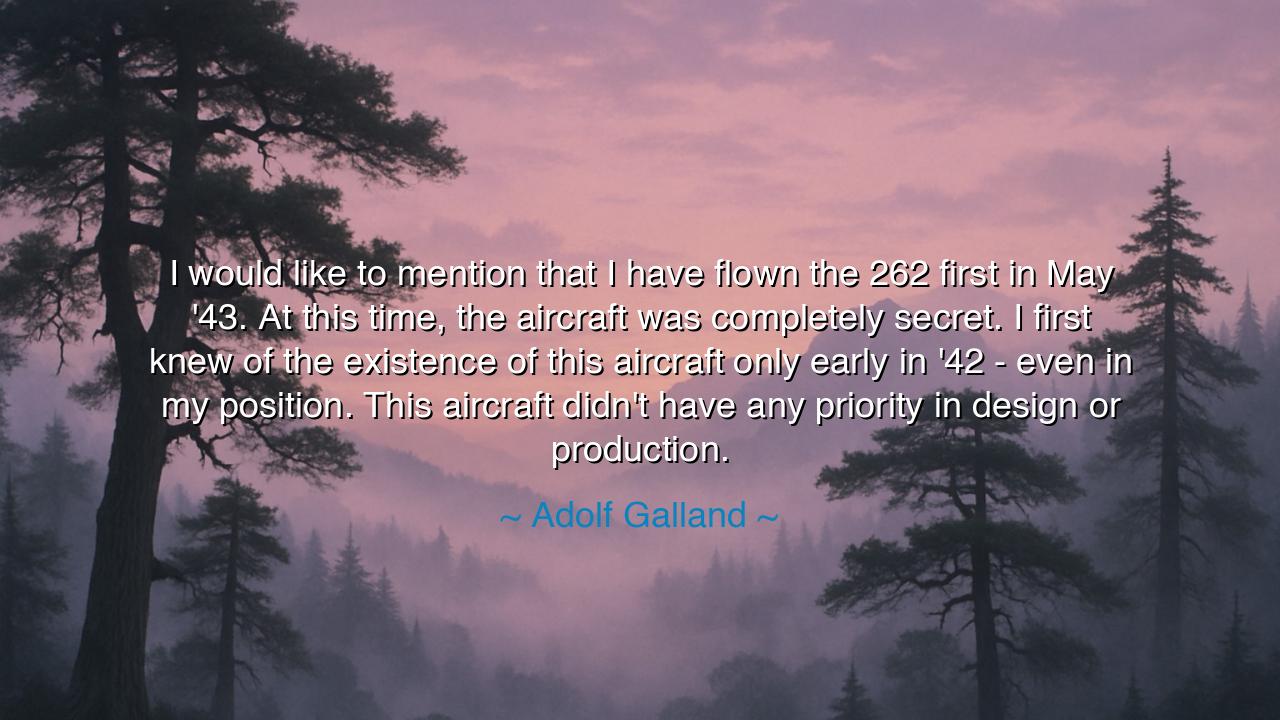
I would like to mention that I have flown the 262 first in May
I would like to mention that I have flown the 262 first in May '43. At this time, the aircraft was completely secret. I first knew of the existence of this aircraft only early in '42 - even in my position. This aircraft didn't have any priority in design or production.






In the shadow of a world at war, when nations bent their genius toward destruction and the sky itself became the arena of destiny, Adolf Galland, one of the most renowned pilots of his time, spoke these haunting words: “I would like to mention that I have flown the 262 first in May '43. At this time, the aircraft was completely secret. I first knew of the existence of this aircraft only early in '42 — even in my position. This aircraft didn’t have any priority in design or production.” His statement, though simple in form, carries with it the weight of history and the sorrow of unrealized potential. It speaks not merely of an aircraft, but of the tragic intersection between innovation, secrecy, and the blindness of leadership.
The Messerschmitt Me 262, known to the world as the first operational jet fighter, was a marvel of its age — a creation that could have rewritten the history of aerial warfare. Galland’s words reveal a bitter truth: that genius, when suppressed or misdirected, becomes a wasted gift. In his tone lies both pride and lament — pride in having witnessed such a breakthrough, and lament in knowing that bureaucratic indecision and misplaced priorities denied it its rightful moment. The Me 262 was a vision of the future born into a world too consumed by the present to understand it.
When Galland said the aircraft “didn’t have any priority,” he spoke of the tragedy that occurs when power fears progress. The leaders of the Reich, blind to the promise of the jet, delayed its production, diverting resources to outdated machines and impractical fantasies. The 262, capable of overwhelming speed and precision, was kept from full use until it was far too late. In this, one sees the timeless lesson: when visionaries are ignored, when innovation is shackled by pride or politics, the world suffers loss beyond measure. The same lesson has echoed through empires and ages — from the fall of Athens to the decay of Rome — that a civilization that fears change will eventually be conquered by it.
The ancients themselves knew this peril. When Archimedes of Syracuse devised weapons of unmatched ingenuity to defend his city, his brilliance was doubted and delayed by those who could not grasp its value. In the end, Syracuse fell — not for lack of genius, but for lack of faith in genius. So it was with Galland’s experience: the Me 262 was not defeated by enemies in the sky, but by hesitation on the ground. The winds of innovation had filled its wings, yet the chains of ignorance held it earthbound.
Galland’s tone, in recalling these events, is not one of boastfulness, but of reflection — the voice of a man who had seen both glory and folly. To “fly the 262 first” was to touch the edge of tomorrow, to feel in his own hands the power of human progress, and yet to watch it fall prey to the errors of the age. His words are a meditation on the fragile balance between courage and caution, between progress and paralysis. For in every age, there are those who see what might be, and those who cling to what has been — and history is shaped by which side prevails.
From his story arises a lesson for all who live and build in any age of transformation. Innovation must not be feared, nor should truth be buried beneath the comfort of old ways. The true danger is not in daring too greatly, but in daring too little. Progress requires risk; wisdom requires vision. The Me 262, born in secrecy and delayed by indecision, stands as a symbol of both what humanity can achieve and what it can lose through fear and shortsightedness.
Therefore, O seeker of knowledge, take heed: when the future whispers its promise, listen with courage. Do not wait for the sea to still before setting sail. Do not let the chains of tradition or hierarchy silence the voice of progress. For as Galland’s story shows, greatness belongs to those who act when others hesitate, and the legacy of the world depends not upon those who preserve what is safe, but upon those who dare to bring forth what is new.
And so, let this truth be passed down to future generations — that vision, once revealed, must not be hidden; that the flame of innovation must not be smothered by fear. The Me 262 was more than a machine — it was a prophecy. It tells us that even in the darkest times, the human spirit continues to dream of flight. But it also warns us: a dream delayed is a dream denied. Thus, let us build, create, and dare — not tomorrow, but today — for the sky belongs to those who believe it can be reached.






AAdministratorAdministrator
Welcome, honored guests. Please leave a comment, we will respond soon